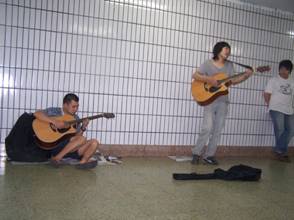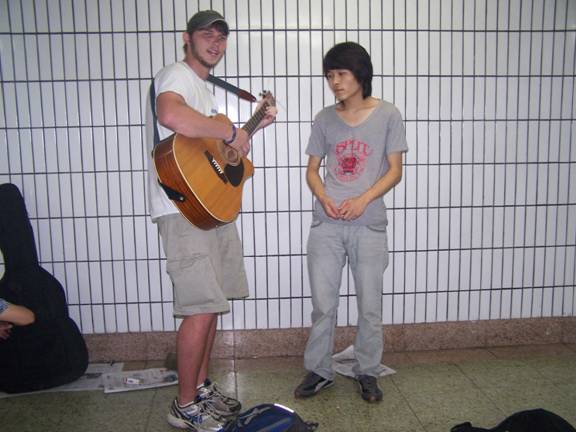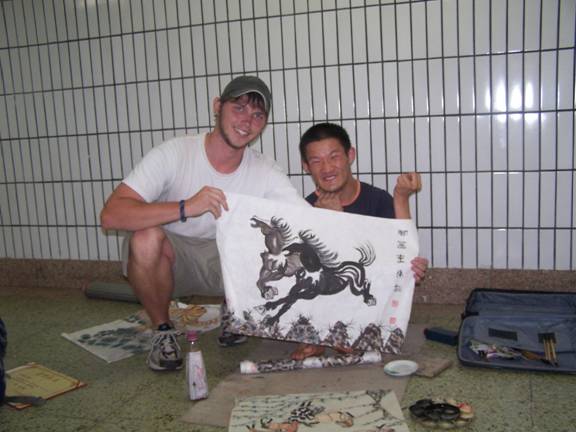By Brian White
Where can you go, what can you do with 100 yuan in Beijing? I had originally wanted to spend my money to go out to one of the many places of natural beauty outside of Beijing proper. However, those plans were quickly foiled by the rain showers that plagued most of the day. They subsided in the afternoon and I managed to get out of my apartment, overwhelmed by the many options in which I could spend 100 kuai (kuai is another way to say yuan, just like bucks is another way to say dollars in English) in Beijing. Being the adventurous person that I am, I took to the streets with no plan at all.
Stepping out into a light drizzle, I instinctively hopped on the first bus that stopped in front of my apartment. I have been studying Chinese back in the States for about 3 years at Appalachian State University in Boone, North Carolina. However, our town lacks Chinese people, so my opportunities to practice speaking Chinese have been very limited. Stepping on to the bus is like stepping into a rolling classroom, and fortunately for me, most Chinese people are always eager and excited to carry on a conversation with a "laowai" or foreigner, no matter how simple or brief. I enjoyed many of these brief conversations with various people on the bus, as they got on and off.
I stepped off the bus at Fuchengmen Inner Street, still with no plan and began to wander down the streets of Beijing. I stopped at various stands offering varieties of Chinese foods from dumplings (Jiaozi and baozi) to meat and vegetables on a stick, and of course guan bing, or as I like to call it, the Peking Pancake. For most people, stopping at just one of these stands is enough to fill you up for less than five kuai, but my perpetual hunger and love for Chinese food allows me to try it all. Not to mention all the walking from stand to stand helps build up an appetite. My wandering brought me through various hutongs, which are narrow alleyways that are formed by lines of siheyuan, traditional courtyard houses. These alleyways come together to create a wonderful escape from the noise and bustle of the main roads.

Popping out from a side road, I found myself on Di'anmen East Dajie (Avenue). I had not walked very far down the street when I heard some noise, attracting me to an underground walkway. The siren like noise which lured me down there turned out to be several young Chinese guys playing guitar and singing, switching off or playingtogether every few songs. Next to the musicians was another Chinese man, an artist who suffered from a physical ailment which prevented him from using his hands. Instead, he skillfully used his feet to paint beautiful portraits of things such as tigers, Chinese landscapes, and horses. I watched both talented acts for about 30 minutes as small crowds came and went. After taking a few pictures, I approached the guitarists to tell them that they play guitar and sing well and tossed a few kuai in to their case. One of them asked me if I could play, and I told him that I knew how to play a few songs. I began to play a song called "Liuxing" by Zheng Jun, which is the one of the only Chinese songs I can play guitar and sing the lyrics to. One of them even began to sing with me. I concluded my concert with a quick rendition of "Gongxi, Gongxi Ni", a Chinese New Year's song.

Before I left to return to the outside world, I crouched down to watch the artist at work. Each stroke of the brush was made with grace and precision. It was amazing to see what this man could do with his feet. He could change brushes, roll up paintings and make cash transactions. I spent about 50 kuai on some of his artwork, as I slipped some bills in between his toes. One of the guitarists asked if I was hungry and me being me, of course I was. I find it hard to turn down a Chinese person when they offer me anything. We went to a little, hole-in-the-wall noodle restaurant and ate some extremely spicy noodles that I could barely finish, partly because the portion was so large, partly because every bite was like putting a flame into my mouth. By the time our meal was over, I had exhausted most of my conversational Chinese and most of the money in my pocket. My friend walked me back to the bus stop and helped me figure out which bus would take me back to my apartment. While I spent all of my money on transportation, food, paintings and tips to local musicians, I felt like I also got much more return from my adventure. I had the opportunity to practice my Chinese and experience Beijing away from the major tourist attractions. Not too bad for 100 kuai.

(china.org.cn July 11, 2008)